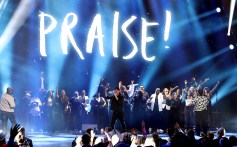billboard green
Page: 2
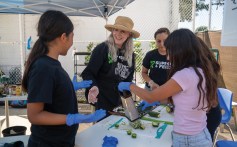
Trending on Billboard
When it comes to convincing major artists to use sustainable merch on tour, it doesn’t take much work, says Bravado president Matt Young. As he puts it, a little competitive spirit goes a long way.
“For us, it’s just about using the platform to tell the story,” Young said at the Billboard Live Music Summit on Monday (Nov. 3) in West Hollywood, California, noting that stars including Billie Eilish, Paul McCartney, Shawn Mendes and Lorde used sustainable merch options on their most recent tours. “And it gets our competition to follow suit. The artists are saying, ‘Hey, how come we can’t do that?’”
Related
Young was speaking during the panel “Building Touring’s Sustainable Future With Maggie Baird.” Moderated by Billboard senior music correspondent Katie Bain, the panel also featured Adam Gardner, frontman of the band Guster and co-founder of the environmental music nonprofit REVERB; and Maggie Baird, founder of nonprofit Support+Feed and mother of Eilish — arguably the most outspoken major artist on the subject of sustainability.
Below are four major highlights from the panel.
The price point for sustainable merch is trending down as more artists adopt it.
While noting that sustainable merch tends to be “a few dollars more” than non-sustainable, Young said that once artists and their teams realize it’s an option, they tend to be open to it.
“The ultimate sell is, ‘This is the right thing to do,’” said Young. “A few months ago, we did a summit in Nashville, where we were sitting down with partners in town and just talking about the options. And half the time, they go, ‘I didn’t realize that.’ And the other part about this is, because we’ve done so much over the last three or four years, we’re starting to see the price gap close a bit.”
Related
Added Gardner, “Once enough artists are asking for the same things, they make permanent change.”
Offering plant-based meals at concerts is actually cheaper.
You know which sustainable option is actually less expensive than the status quo, according to Baird? Plant-based food. That’s helpful when it comes to her organization, Support + Feed, selling organizations on offering more non-meat options.
“One of the whys [to offer plant-based options] is you can save money,” said Baird. “That’s really an important part of the storytelling, is getting arenas to understand it’s actually cheaper to serve whole, plant-based foods. And then we offer tools — tools about menu guidance, creating dishes, how to sell more of them. You don’t just put the vegan option at the bottom [of the menu]…you want it to be No. 2.”
Some sustainable options take a little more convincing than others.
In attempting to sell artists and their teams on battery-powered vs. traditional diesel-powered generators, Gardner says it took proof of concept to get more artists on board. That proof of concept came courtesy of Eilsh, who partially powered her headlining seat at Lollapalooza 2023 using zero-emissions battery systems, charged using solar power, without a hiccup.
Related
“The first step was just convincing folks that it was feasible and that it was okay,” said Gardner. “Because obviously, when you’re talking about powering the stage, nobody wants the power to go out during a concert. So it is scary, and yet it’s also necessary.”
Once Eilish’s 2023 Lollapalooza set proved it could work, the festival “has continued to use battery[-powered generators] since that year.” In 2025, Lollapalooza announced its main stage would be entirely powered by a hybrid battery system — a joint effort by REVERB, C3 Presents and Live Nation’s Green Nation sustainability initiative.
This is just the beginning.
While some strides have been made on the sustainability front in the touring business, there’s still a lot more work to be done. As Young optimistically put it, “The beauty of this is, every day, there’s a new, innovative, entrepreneurial company trying something new in this space.”
He added, “We’re just getting started.”
Trending on Billboard Anyone who’s received an email inquiry from promoter and music manager Barrie Marshall might need to double-check that it was really him. Representatives from Marshall Arts sent out a rare press release on Friday (Oct. 31) warning that someone is impersonating the AEG-aligned promoter, who works with stars like Paul McCartney and […]
Trending on Billboard
Udio now says it will briefly allow subscribers to download their existing songs following widespread backlash to drastic changes made to the platform following the AI firm’s licensing settlement with Universal Music Group (UMG).
The move comes in response to growing outrage — and even threats of legal action — from users after Udio struck the UMG deal, under which the AI company immediately barred its paying subscribers from downloading their own songs, even those they had created long before the UMG deal.
Related
In the statement posted late Thursday (Oct. 30) to Reddit, Udio said it would provide a 48-hour window starting Monday (Nov. 3) for all users to download their existing songs. Any songs downloaded during that time will be covered by the prior terms of service that existed before the UMG settlement.
“Not going to mince words: we hate the fact we cannot offer downloads right now,” Udio CEO Andrew Sanchez wrote in that post. “We know the pain it causes to you, and we are sorry that we have had to do so.”
In the Reddit post, Sanchez also tried to explain the reasons for the original change, saying that Udio is a “small company operating in an incredibly complex and evolving space” that had chosen to partner directly with artists and songwriters. “In order to facilitate that partnership, we had to disable downloads,” he said.
Related
If the download ban is a requirement of the legal settlement with UMG, how can Udio now reverse course and allow users to download their songs? Sanchez said Udio had “worked with our partners to help make this possible.” A spokesman for UMG did not return a request for comment.
Any existing songs that are downloaded during next week’s window will be owned by the users who made them. Under Udio’s terms of service, the company grants all users of the platform — paid subscribers or free users — any ownership rights to their songs, including express permission to use them for commercial purposes. The company does require users of the company’s free tier to include attribution that the song was made with Udio.
The deal between UMG and Udio, announced Wednesday (Oct. 29), will end UMG’s allegations that Udio broke the law by training its AI models on vast troves of copyrighted songs. Under the agreement, Udio will pay a “compensatory” settlement, and the two will partner on a new subscription AI service that pays fees to UMG and its artists, and allows artists to opt in to different aspects of the new service.
Related
The revamped Udio will be quite a bit different from the current service — a “walled garden” where fans can stream their creations but cannot take them elsewhere. While the new version won’t launch until next year, the firm immediately disabled all downloading on Wednesday, a move that drew predictable backlash from its users, particularly on the company’s Reddit sub.
“This feels like an absolute betrayal,” wrote one Reddit user. “I’ve spent hundreds of $$$ and countless hours building tracks with this tool,” wrote another. “No one warned us that one day, we wouldn’t even be able to access our own music. You can’t just pull the plug and call that a ‘transition.’”
Some Udio subscribers even floated the idea of legal action: “What you have committed is fraud. Just so you understand,” wrote one user. “You may not feel any legal ramifications immediately, but not everyone who used your platform is without resources.”
The window for downloads will kick off on Monday, but it’s unclear exactly when. Udio said in the post that it would “provide the exact starting time and end time” on Friday (Oct. 31), but had yet to do so by Friday afternoon. An Udio spokesperson did not offer more details when reached by Billboard for comment.
For over two decades, Keith Caulfield has been an integral part of the Billboard charts team, tabulating which singles and albums are the most popular in the United States. To be more specific, Caulfield — managing director of charts and data operations — looks after the Billboard 200, the standard bearer for an album’s performance […]
Trending on Billboard
The growing prominence of faith-based/Christian hip-hop and R&B, aka Rhythm + Praise, is resonating far beyond the traditional radio airwaves. It’s making notable shifts into film, TV, sports and even the gaming world. Rhythm + Praise (R+P) artists possess the ability to marry powerful messaging with innovative sounds and, in the process, are finding their music being featured in an ever-expanding range of media — often in ways directly impacting the cultural landscape.
Sitting between gospel and contemporary Christian music (CCM), Rhythm + Praise bridges gospel with contemporary styles, offering a more modern, relatable sound for younger audiences. R+P offers an alternative to mainstream secular messages: non-traditional in format, melody, lyrics and production. Not limited to religious beliefs, these artists foster themes of hope, redemption, mental health awareness and positive living.
Related
According to Luminate, in the first 30 weeks of 2025, on-demand audio streams of songs in the core Christian/gospel genre — which were also categorized in the sub-genre of R&B/hip-hop —totaled 1.37 billion, up from 878 million during the same 30-week period in 2024. These figures are inclusive of user-generated content (UGC) streams.
Four-time Grammy winner Lecrae and Dove Award-winning artist NF have been paving the way in faith-based hip-hop for years. Both artists have individually accumulated billions of streams and video content views. Lecrae has 2.03 billion and NF has 13.28 billion on-demand official audio and video streams for all of their songs, over the course of their careers, in the U.S. through Sept. 25, according to Luminate. (Note: These figures do not include UGC streams.) Given the powerful reach of their music, both NF and Lecrae have successfully secured licensing and sync opportunities in the sports gaming arena, marketing their music via the NBA, ESPN and Madden NFL video game series.
Another example is emerging independent hip-hop artist Miles Minnick. He recently released his first album, Via Dolorosa, through his GLO label joint venture with EMPIRE. Minnick is also reaching beyond the church-going audience via his first sports gaming sync placement, “Lowkey Wildin,” with NBA 2K25. His growing base of more than 500,000 fans — aka GLO Nation — prompted the launches of his GLO Festival in the San Francisco Bay Area and his own clothing line, Christlike. Minnick also made history in March when he became the first Christian hip-hop artist to headline a stage at Rolling Loud Los Angeles.
Related
Noting that Gen-Z and millennials are demanding more uplifting content, Minnick says a major cultural shift, which he tags the “New Mainstream,” is happening. “New Mainstream isn’t just a phrase — it’s my lifestyle,” he explains. “It means putting faith at the center of culture and proving you can be bold about your beliefs while making a real impact. Whether it’s getting the stamp [of approval] collaborating with rap icon E-40, launching a label, performing at Rolling Loud or selling out tours, I’m showing the world that you don’t have to change who you are to change the world.”
Mainstream artists are also magnifying messages of faith in their music. From Drake (“God’s Plan”) and DJ Khaled (“God Did”) to Mustard (“Pray for Me”) and GloRilla, who won her first BET Award for best gospel/inspirational song (“Rain Down on Me” featuring Kirk Franklin, Maverick City Music, Kierra Sheard and Chandler Moore), these artists are helping to broaden the crossover space for faith-based music.
The same thing is happening on the label front. Co-founded with Ben Washer in 2004, Lecrae’s Reach Records is now seeing other music companies join the movement, including EMPIRE and Universal Music Group. Earlier this year, the latter relaunched legacy label Tamla with a faith-based hip-hop/R+P artist roster that includes Childlike Cici and Dante Pride. One of Tamla’s artists, Dove Award nominee Lee Vasi, performed at this year’s BET X 106 & Park Experience in Los Angeles. And gamma., home to Mariah Carey and Usher, established a joint venture with Grammy-winning producer Rodney Jerkins’ R+P imprint Alienz Alive with signees Alex Jean, Jon Keith, Aha Gazelle and nobigdyl.
Related
While streaming numbers are strong, streaming radio still remains an important promotional tool in expanding audience reach. And that’s thanks to shows like the Trendsetter Sense-hosted Chosen Journey on SiriusXM’s Hip-Hop Nation channel and Da Fixx on SiriusXM’s Christian hip-hop/R+P channel, Holy Culture Radio. Holy Culture owner James Rosseau Sr. partnered with SiriusXM in 2022 to cater to a burgeoning audience of more than 5 million listeners, per Nielsen Compass.
Film and TV are also homing in on the faith-based market. Producers Tyler Perry and DeVon Franklin, heavy hitters in both of those arenas, joined forces with Netflix for Ruth + Boaz. The just-released film features the original song “Faithful,” penned specifically for the project by Grammy-winning artist/producer Babyface. It also appears on the film’s five-song companion EP.
As a music supervisor starting out in faith-based television programming, I produced season 2 of the award-winning soundtrack album for the hit series Greenleaf. I’ve seen firsthand how the power of positioning faith-based hip-hop/R+P artists on a major network show (scripted or unscripted) can help break their music and expand their brand.
Related
In response to that and other above-referenced factors, I established the traveling roundtable series Faith + Sync in L.A. this year. I wanted to provide a unique platform to discuss how faith is influencing culture, creative direction, content placement and the future of music in film, TV and digital media. And also to offer the opportunity to connect with influential voices in those mediums who are shaping the conversation about how faith-based/R+P artists are influencing music, sync licensing and culture.
Through changing demographics, streaming power and strong independent success stories, faith-based hip-hop/Rhythm + Praise is debunking assumptions by mainstream media about its audience size, relevance and impact. As this movement gains stronger momentum, I’m committed to joining all those building the bridge to keep pushing this music forward like EMPIRE president Tina Davis. “Inspirational hip-hop/R&B isn’t new,” says Davis. “But there’s a new wave of anointed young talent across the globe raising their hands in their God’s name. And it’s needed!”
Angela M. Jollivette, founder of Moonbaby Media Inc. and Faith + Sync, is an award-winning music supervisor/producer whose credits include the major network series Greenleaf, Sunday’s Best, Black Ink Crew: New York/Chicago/L.A. and Norman Lear’s final TV production, Clean Slate.
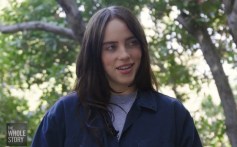
Trending on Billboard
It’s the tail end of September’s Climate Week: NYC when Maggie Baird gets on Zoom from her hotel in the city, ceramic mug of tea in hand.
The mother of Billie Eilish and FINNEAS, as well as a staunch activist for sustainability and plant-based food access, Baird calls her time at Climate Week a “mixed bag of emotions”: She has participated in troubling events addressing the grim effects of climate change, but has also learned about the more hopeful work that’s happening around the world to address it.
“It’s a very dark time and there’s a lot going on,” she says. “Climate change is a threat multiplier. Every single other issue you care about, climate is there making it worse.”
Maggie Baird will participate in a panel at Billboard‘s Live Music Summit, held Nov. 3 in Los Angeles. For tickets and more information, click here.
Related
But Baird, who quotes Joan Baez’s famous “Action is the antidote to despair” declaration, has been a force during the event. Support + Feed, the organization she founded in 2020 that provides hot, plant-based meals to people in need, distributed roughly 2,500 of these meals, along with pantry items, across New York. She and representatives from the nonprofit used this time in the community to talk about plant-based diets as crucial mechanisms of positive environmental impact, with the week’s efforts also connecting various community organizations with climate thought leaders. The week ended with a Support + Feed “friend-raiser” event that hosted climate activists, community members and celebrities like Martha Stewart and Eilish, who turned out to support her mother.
“The main thing I would say about this time is that it’s a moment for radical collaboration,” Baird says. “Every organization I know and work with, we’re just like, ‘How can we be better together?’ We have to multiply — exponentially.”
For Baird, however, every week is Climate Week. Having worked with her children and their respective teams to meaningfully integrate sustainability into their careers, she’s essentially a frontline reporter on sustainability within the music industry.
One sector where she’s seeing “really exciting advances” is merchandise. Baird is a longtime collaborator with Bravado, the merchandising and branding division of Universal Music Group that recently sent 400,000 obsolete and unsold tour T-shirts and other unused items by ship from Nashville to Morocco, where they were repurposed into new yarn by sustainability-focused textile manufacturer Hallotex. The yarn will be used to make new items in Europe to avoid the emissions of shipping them back.
Maggie Baird, Finneas, and Billie Eilish at the Support + Feed Fall Fundraiser Event on Oct. 24, 2023.
Zoe Sher
For Eilish’s merch, the Bravado team has successfully collaborated with upcycling and sustainability-focused clothing companies Rewilder and Suay and designer Iris Alonzo, the co-founder of the Everybody.World brand. Suay, for example, took hundreds of dead-stock work shirts, added sleeves and embroidered “Billie” on each piece, while some of Eilish’s old merch was repurposed into bags. “The upcycled items sold out so fast,” Baird says, “because there were limited quantities and they were extremely unique, and unique to Billie.”
Meanwhile, a program developed by Eilish’s Live Nation touring team, Support + Feed and Reverb, the long-standing nonprofit focused on music industry sustainability, now requires that any venue hosting an Eilish show must sell at least three plant-based main courses — and some venues have even gone entirely plant-based for Eilish. (Her sold-out Hit Me Hard and Soft world tour began in fall 2024 and runs through November.) The team also hosts educational webinars for venue culinary staffers to educate them about plant-based eating.
“It’s about trying to help them understand that the arena has an obligation to clientele, to planet and to cost,” Baird says. “It’s all done in a friendly, helpful way. We’re very welcoming and excited that they’re willing to even take the call, frankly.” The goal is for venues to maintain more robust plant-based approaches long after Eilish leaves. “It’s really about helping people understand that you’re not just serving your customer better while being better for the planet,” Baird explains, “but that you can actually save money.” These savings are achieved by reducing reliance on meat and incorporating more dishes made with lower-cost ingredients like beans, lentils, grains, fruits and vegetables; meals built around whole-food ingredients are often significantly more affordable to produce.
She is aware that implementing such programs takes resources. Eilish has helped fund Support + Feed and Reverb to be on-site at shows by rising artists who don’t yet have the funds to host these groups themselves. “I think it’s important that we reach down,” Baird says. Fans can also buy more expensive “changemaker” tickets for Eilish’s shows, with 50% of the revenue from each tagged for sustainability projects. One dollar of every regular ticket sold is also donated.
While Eilish is among the most visible musicians promoting sustainability in the industry, Baird’s hope is that even if artists don’t want to publicly discuss their efforts, “they’ll still just do it. They don’t have to make it as outward as what we’re doing, but they can just do it as a given.”
Maggie Baird and Hayley Williams of Paramore deliver meals on June 28, 2023, as part of Baird’s volunteer work for her nonprofit organization, Support + Feed.
Zoe Sher
All these initiatives are happening in a year when Support + Feed has responded to a host of disasters. It fed locals in Los Angeles following the devastating California wildfires in January and in Tennessee after intense flooding in April. (Baird notes that in the wake of such events, Support + Feed representatives stay on the ground long after many other response organizations move on to the next crisis.) The communities Support + Feed serves have also been “very impacted” by U.S. Immigration and Customs Enforcement raids, “so we’ve had to really be nimble in how we feed people and how we convene,” Baird says.
Still, the organization is expanding its offerings, now providing, in addition to hot meals, free produce from local farmers and cooking classes and recipe cards for people who may be unfamiliar with the produce they’re receiving.
“We’re really increasing our education and our outreach as much as possible,” Baird says, “but also just feeding, feeding, feeding, feeding, feeding. The need now is tremendous with all the food programs being cut.
“It’s a very intense time,” she continues, “but there are so many people doing great things.”
This story appears in the Oct. 25, 2025, issue of Billboard.
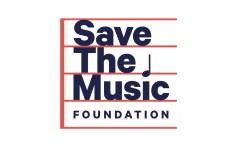
Trending on Billboard
Shortly after Paramount began pulling back its funding for Save the Music, which has donated instruments and tech equipment worth nearly $78 million to 2,800 U.S. schools, John Sykes held a Rock & Roll Hall of Fame board meeting in spring 2024. “This is the perfect fit for what we’re doing,” he told the group. “We have this huge, powerful platform, with some of the greatest artists in the world that we could put out there, going to schools, preaching the importance of music education.”
Beginning with a $1 million grant, and the promise of Hall of Fame inductees like Sheryl Crow and pop stars like Harry Styles and Olivia Rodrigo talking to students at schools around the U.S., the Hall of Fame announced a partnership with Save the Music on Tuesday (Oct. 28) to help fund Save the Music’s dozens of programs. “We hope the politicians and the local governments will hear about this story and find out why music education must stay, or must be reconnected with a public education,” says Sykes, the Hall of Fame’s foundation chairman, a top executive at broadcast giant iHeartMedia and an MTV co-founder who created Save the Music in 1997.
Related
Save the Music was once synonymous with VH1, where Sykes was president, and major stars like Aretha Franklin, Whitney Houston and Mariah Carey headlined charity performances broadcast live on the powerful cable-music channel. But in recent years, Paramount has deemphasized its MTV and VH1 holdings, ramping down on its Save the Music support in the process. As a result, Save the Music has spent the last few years turning to other sources, including TikTok, Meta, Amazon and top promoters Live Nation and AEG Presents. In 2021, MacKenzie Scott, co-founder of Amazon and Jeff Bezos‘ ex-wife, provided a $2 million grant.
“As Paramount’s support gradually came down,” says Henry Donahue, the Save the Music Foundation’s longtime executive director, “we were very fortunate that a number of large foundations came in to fill the gap and actually grow the program.”
Save the Music, whose operating budget was $11 million last year, supports high-school students with initiatives like the J Dilla Music Technology Grant, named for the late hip-hop producer, which provides music-tech equipment and software for students and teachers. “The program is extremely valuable to students,” Samuel Davis, a Therrell High School teacher whose Atlanta classroom benefited from the grant, told the AP in January. “It increases their attendance. They’re more willing to come to school. They feel more connected to the school.”
Related
Sykes created Save the Music after participating in a principal-for-a-day event at a New York high school, where he encountered music students playing instruments “held together with tape and missing strings,” he recalls. He offered $5,000 on behalf of VH1 to prevent the school from cutting the music program, then decided to expand the channel’s philanthropy after learning that “students who learn music education go on to do better on math and verbal scores on tests.”
Today, Save the Music invests in 100 to 150 U.S. music programs, drawing celebrity support from Ed Sheeran, Jelly Roll and others who’ve donated time and money. The Cleveland-based Hall of Fame, according to Sykes, has music-education programs, but the partnership with Save the Music will take them to “a whole new level.” Says Donahue: “It’s an incredible boost.”
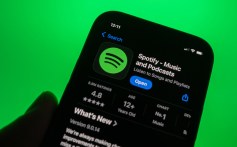
Trending on Billboard
A lot is changing at Spotify. In recent weeks, the company announced its founder and CEO, Daniel Ek, is stepping down from the CEO post (he will stay on Spotify’s chairman); it announced plans to develop generative AI music models with the support of the music industry; it updated its AI policies; it finally launched lossless audio; it updated its free tier; it forged new deals with a number of top music companies; and the company rolled out a number of new features, like direct messaging and “Mix With Spotify.”
The changes are a lot to keep track of, so on this week’s episode of Billboard’s new music business podcast, On the Record w/ Kristin Robinson, Spotify’s global head of marketing and policy, music business, Sam Duboff, joins to explain how the company is evolving, from a static destination for music consumption to what he calls “a place where fans can experience the whole world of an artist.”
Related
Duboff is one of the executives who determines how Spotify will handle the growing presence of AI music on its platform. He also is key in the development of Spotify for Artists, the company’s hub for musicians that enables them to manage their artist profiles and connect with fans.
Below is an excerpt of Billboard’s wide-ranging conversation with Duboff on this week’s episode of On the Record, focusing on its treatment of AI music on the platform.
Watch or listen to the full episode of On the Record on YouTube, Spotify or Apple Podcasts here, or watch it below.
I wanted to hear a little bit more about the fact that y’all are developing generative AI with the consent of many players in the music industry. There isn’t much information out there, so what is going on?
Duboff: We have been hearing from artists and their teams for a few years now that merging music AI tech products don’t feel like they’re built for them, not built for the power of their businesses, their careers, their existing fan bases. So we recently announced we’re collaborating with some of our top industry partners, across major labels and indies, to collaboratively develop artist-first, responsible AI music products.
So what would that look like?
We want to do this in consultation with the industry. People talk to artists about it, songwriters about it, and it feels like a lot of principles about AI and music and what these should look like. It’s happening in real time. So we didn’t want to wait until we have a product ready for a big launch to start talking about how we’re going to build AI products. We want to talk now, while we see lots of other folks in the industry are investing in the space, to be clear about our principles and how we’re gonna work with the industry for any product we build. So we’re looking at four key principles we outlined.
Related
First, [we have forged] upfront agreements with the music industry. [We are] not using tons of music [without permission] and asking for forgiveness later. Second, we wanna make sure artists, songwriters, rights holders have agency and choice about how their music does or doesn’t participate in these tools. They should have control and choice around how fans can or can’t interact with the music using AI. Third, we will always have proper monetization and compensation built in. So artists, songwriters, right holders [are] always compensated for all uses of their work [and] properly credited transparently. We’ll have an eye towards building new revenue streams for the music industry, so not just splitting up the existing royalty pool. We think that could be really important for powering what the next stage of the music industry looks like. Fourth, and really important to us, when we think about our role right now in music, is we want to build AI music products that deepen existing artist-fan connections. With 700 million monthly listeners coming to Spotify already, to listen to their favorite artists, we can play this really unique role where we build tools and help fans go deeper with their favorite artists and connect with their favorite artists in new ways, and make sure AI tools aren’t there to kind of compete with artists or to try to replace human artistry.
I know it is still very preliminary, but you talked about how this will increase the connection between fans and artists. Tell me if I’m off base, but it kind of sounds more like Spotify is leaning towards AI-powered remixing of current songs, rather than a model that generates a new song from scratch, like Suno or Udio, right?
Yeah. I think we see our role as the biggest streaming home for professional artists today. We facilitate those connections between artists and fans through their music already. So we think we’re best positioned to help have AI power this next stage of the industry. In some ways, it’s just in that space of existing artists and connections and building on artists’ catalogs with their consent. Yeah, not tools that are built to compete or kind of siphon off [royalties] from parts of the industry.
Related
To me, this signals a shift for Spotify. Spotify has always been the final destination for listening. This now feels like it’s a more playful, interactive music creation tool. Do you see Spotify continuing to expand from being the place for static streaming?
Over the past few years, we’ve been evolving Spotify from a place that’s just about the music to giving artists all these tools to share the world around their music. So three, four or five years ago, on Spotify, you get an artist profile with some pictures and canvases [looping visuals paired to songs]. It was mostly just about the music, and then you’d have to go to social media or elsewhere to experience the artist’s broader world. Where we’ve been focusing is bringing in artist clips so that artists can share 30-second videos, sharing the meaning of their songs, music videos, live performance videos, which we’ve launched in 100 countries outside the U.S. We’re working to bring that to the U.S. [There are] countdown pages that build up your album release. You can sell your merch in advance. We’re seeing artists use that in really creative ways. So we’ve already been on this journey of making Spotify a place where fans can experience the whole world of an artist. These AI music principles are an extension of that philosophy.
Spotify has also recently updated its policies on AI music. This included a note that the service has removed “75 million spammy tracks.” I’ve seen some outlets post stories about this figure incorrectly, calling it 75 million AI tracks, but it feels like the word “spammy” is intentional, referring to both AI spam and human-made spam. Can you explain what Spotify meant by this?
We’ve definitely seen modern Gen AI tools increase the scale of spam, and so certainly AI played a role in this scale. Not so long ago, there weren’t even 75 million tracks on streaming services, and now, we’re removing that many, but yeah, we’re working to identify spam, regardless of whether AI’s part of the creative process or not.
Related
Spotify is also working with DDEX to create a standardized way to disclose exactly how AI is used in the music creation process. It feels like a step in the right direction to create a standard, but if I’m a bad actor, why would I self-disclose? I probably wouldn’t.
We see this as the first step. No matter what the long-term solution is going to be, of the system of incentives and deterrence that will get people to disclose, the starting point has to be shared language through the existing supply chain of music about what the formatting of that will be.
But I think you do see already a lot of artists, songwriters, producers, starting to talk about how they’re using AI more often. So you see the K-Pop Demon Hunters songwriter who talked about brainstorming with Chat-GPT when he wrote “Soda Pop” through to Brenda Lee using AI to translate “Rockin’ Around the Christmas Tree” into Spanish, but still her voice. It was so cool, but it may have been confusing for Spanish listeners, if they thought Brenda Lee or any artist spoke a language they don’t speak. Now, [with the DDEX partnership] it will be really cool for them to know transparently [exactly how AI was used.]
When Spotify came out with these policies, it did feel like a start, but I heard from some people that they felt it didn’t go far enough. So, what do you say to those who feel like it’s not going far enough?
It’s early days for AI tech. I know it feels like it’s moving fast, but consumption of AI-generated music’s insanely low. We have some time for artists, songwriters, producers to take the lead in figuring out how they want to use these tools. We don’t want to act like we know where AI music’s headed and exactly every policy and role we need to future-proof for the next two or three years. But also, we didn’t just want to wait and do nothing. Some areas we all can agree now that we need to act now, no matter where AI tech heads. We think it’s going to be necessary to have great systems in place to stamp out spam, deception, impersonation. So that’s our starting point. We try to be upfront. We see these as first, critical early steps. There’s more to come.
Related
French streaming service Deezer reported recently that 28% of daily uploaded songs are fully AI-generated. That’s a shockingly high number. At Spotify, have you seen the same figures?
AI detection tech isn’t really foolproof yet. You know, every streaming service has pretty much an integral catalog. We have no reason to disbelieve it’s a similar amount on any streaming service. That said, I think they shared the point that .5% of streams is all those songs were getting. We’ve tried a few different tactics to test that — different detection tech, testing out different proxies — to understand how much prompt-generated music may be listened to on Spotify, and we find it is way lower than .5% in the share of streams, in total consumption. So I know sometimes it feels scary when you see those upload percentages…but yeah, there’s a lot of uploads [of AI music.] We’re doing a lot of work to release that kind of spam, where there are mass uploads that can add up to those kinds of percentages, but keeping a close eye on the part that actually matters, which is, are listeners listening to it? Is it generating royalties?
Consumption being really low makes me think that it must be a burden on streaming services to hold all of this music, especially when no one’s listening to it. Would Spotify ever remove tracks that are just getting absolutely no traction?
I don’t think so. Whether they’re AI or otherwise, people upload their music to streaming services for all different reasons. I have family members that upload music to send to family and friends. That’s a great thing at Spotify, [where] we are focused on emerging and professional artists. Our policies are in service of professional artists and emerging artists on their way to that. So we take on the burden of how many songs are uploaded, and certainly the overwhelming majority of songs aren’t getting streamed much. I still think it’s really important for there to be this open outlet.
Related
Is this a cloud storage issue? I have no idea how big these songs are to hold onto.
Maybe someday, with AI scale, it will be.
Earlier this year, I spoke to Spotify’s global head of editorial, Sulinna Ong, and I asked her about whether or not she would ever forbid AI tracks from living on Spotify editorial playlists. She didn’t have a clear answer at that moment — it wasn’t a yes or a no, so I wanted to ask again. Could you ever imagine fully AI-generated tracks living on a Spotify playlist?
It’s a hard question, because I think we recognize AI music as a spectrum… I think what you’re getting at is completely prompt-generated music without any human input. Is there some world where listener behavior really changes, and there’s huge musical, cultural relevance from music that doesn’t spam, deceive or impersonate, but somehow finds an audience, [that] could make it on to a viral hits sort of playlist? I can’t speak for their team, but fundamentally, 100% of the focus of our editorial efforts is helping to identify, uplift [and] develop the careers of professional artists who are making amazing music. So it’s always hard to answer that question in absolutes, but certainly that’s not the focus of anyone at Spotify, or, I think, any streaming service.
Trending on Billboard
Rayna Bass and Selim Bouab have been appointed executives-in-residence at the Warner Music/Blavatnik Center for Music Business at Howard University in Washington, D.C. The pair are the co-presidents of 300 Entertainment and Atlantic Records Hip-Hop, R&B and Global Music.
Bass and Bouab’s appointment is in keeping with the center’s goal to connect Howard University’s students with top executives in the global music industry. The program provides one-on-one mentorship, master classes and practical insights about executive leadership, creativity and the future of the business.
Related
In the press release announcing the duo’s new roles, Jasmine Young, MBA, director of the Warner Music/Blavatnik Center for Music Business at Howard University, commented, “Rayna Bass and Selim Bouab are two of the most visionary leaders in the industry, and we are honored to welcome them as executives-in-residence. Our students will benefit directly from their knowledge, creativity and commitment to breaking barriers. This appointment reflects our mission to provide Howard students with direct access to the highest levels of leadership in the global music industry.”
“Howard University, together with the Warner Music/Blavatnik Center for Music Business, has a strong legacy of cultivating bold, creative leaders,” said Bass and Bouab in a joint statement. “That mission aligns with what we do at our label, and we’re excited to share our experiences and help raise up the next generation of music business innovators.”
Bass took on an expanded role within the Atlantic Music Group earlier this year when she was appointed co-president of Atlantic Records Hip-Hop, R&B and Global Music. She initially joined 300 Entertainment as its first marketing hire in 2014. Promoted to senior vp of marketing in 2019, Bass was elevated to co-president of 300 Entertainment in 2022. A Billboard Women in Music and R&B/Hip-Hop Power Players honoree, Bass has helmed campaigns for Megan Thee Stallion, Young Thug, Gunna, Mary J. Blige and PinkPantheress, among other artists.
Related
Since joining 300 Entertainment as well in 2014, Bouab later served as the label’s senior vp and head of A&R before being named co-president with Bass in 2022. Then again alongside Bass, Bouab added the co-president post at Atlantic Records Hip-Hop, R&B and Global Music this year. Along the way, he has signed, developed and collaborated with artists including Megan Thee Stallion, Fetty Wap and Tee Grizzley as well as Young Thug, Gunna and Jordan Adetunji. Bouab, who’s also established his own Unauthorized Entertainment label, is a multiple-year Billboard R&B/Hip-Hop Power Players honoree.
“Rayna and Selim embody what it means to lead with both innovation and integrity,” stated Julian Petty, executive vp and head of business/legal affairs for Warner Records and the Warner Music/Blavatnik Center’s Visionary. “Their careers represent the possibilities for our students, and their willingness to pour into the next generation is what makes this partnership so special. The center continues to set the standard for excellence in music business education, and I am thrilled to see Rayna and Selim take on this role.”
Trending on Billboard
Seemingly small initiatives can make a big impact when it comes to making festivals greener — a point Oregon’s Cascade Equinox Festival is demonstrating with its ongoing sustainability program.
The festival’s third edition happened Sep. 19-21 in Redmond, Oregon, with organizers once again implementing a program they say has helped plant hundreds of trees and protect thousands of acres of rainforest in the event’s first three years.
Related
The program is designed around the “Eco-Band initiative,” which allows attendees to upgrade their passes to include a 100% hemp wristband for $20. A representative for the event reports that this year’s program raised enough money to plant 394 trees in Oregon forests and to protect roughly 511 acres of land in Ecuador. Another roughly $700 raised through donations on the festival’s website went to the protection of another 177 acres of the same Ecuadorian land, which is home to jaguars and Andean bears.
Since Cascade Equinox’s 2023 debut, the hemp wristband program has raised funds to plant 601 trees in the local Willamette National Forest and to protect 1,665 acres of Amazon rainforest. The latter initiative has been done in partnership with SAVIMBO, an organization founded by Indigenous leaders in the Colombian Amazon that pays Indigenous peoples and subsistence farmers in tropical forests to preserve these ecosystems. The festival’s project has specifically worked with the Cofán Indigenous Community in Chandia Na’en, Ecuador.
The hemp wristband program was executed in partnership with Green Disco, an organization composed of promoters, producers and environmental experts who consult on live events, along with Earthwin.org, which works to expand education on mindful living for global well-being.
“Sustainability is a core principle for Cascade Equinox, and in leading by example we hope that other festivals notice and make similar efforts and improvements,” festival organizer Josh Pollack tells Billboard. “We’re thrilled to have planted over 600 native trees locally in Oregon and preserved over 1,600 acres of Amazon rainforest in Ecuador over three years. Big thanks to Earthwin and Green Disco for being incredible partners and sharing our vision for music festivals making a positive ecological impact both locally and globally.”
The 2025 edition of Cascade Equinox Festival featured artists including Sylvan Esso, Disclosure, Big Gigantic, TroyBoi and Chromeo. The next event is slated for Sept. 18-20, 2026.
Billboard‘s Live Music Summit will be held in Los Angeles on Nov. 3. For tickets and more information, visit https://www.billboardlivemusicsummit.com/2025/home-launch.

 State Champ Radio
State Champ Radio 


